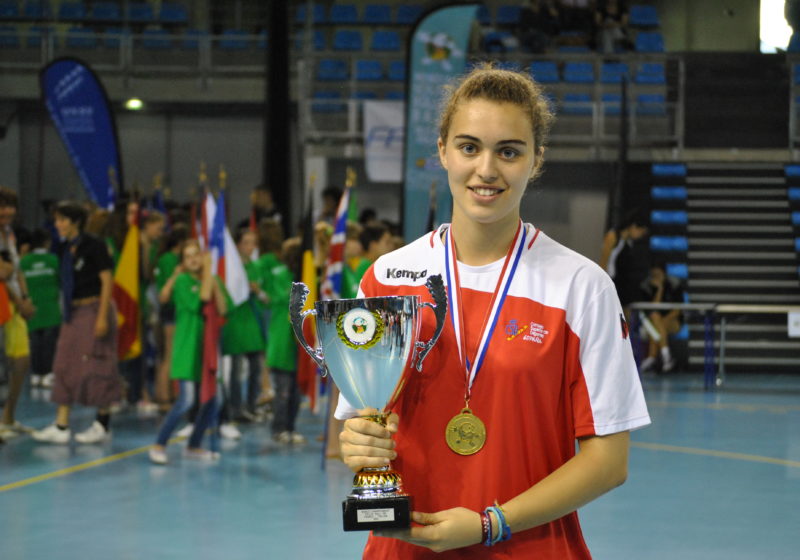Standing at over six feet tall, sophomore Clara Martinez dominates the net, casually swatting balls and blocking viciously spiked hits, all with a smile. Martinez’s past in the sport is impressive, having played professionally since she was 14 and on a Division I team for a year.
Her background, however, is not only in volleyball . Growing up around a grandfather working in engineering, she was drawn to mechanical objects, built radios in her spare time, and became fascinated with computers and their electronics . After struggling to balance her two interests during her freshman year of college, the middle blocker made the difficult decision to choose academics over sports.
Growing up in Spain, Martinez was exposed to, and excelled in, multiple sports. She earned a black belt in judo and gained experience in several other martial arts and sports before first being exposed to volleyball at the age of 13. Martinez considers her involvement in sports to be a turning point in her life: having to work with others, supporting a team and, in turn, being supported by them has had a positive effect on her.
She instantly fell in love with volleyball and jumped at every chance she got to play, even staying out late to play with older teams. Her talent was quickly noticed and she was recruited by the Spanish national team, where she played and lived with her teammates—all her age. Even while she was a member of the national team, Martinez played club volleyball on holidays and during the off-season.
“The difference between being great and ordinary is just the extra,” Martinez said.
It is no surprise that she pursued and was recruited by multiple Division I teams in the U.S. Ultimately, she chose Bowling Green State University in Ohio, and travelled to the U.S. in the hopes of advancing her career in volleyball as well as pursuing a degree in electrical engineering.
Arriving at Bowling Green, Martinez discovered how difficult it was to be an athlete first and a student second—a common practice at many Division I schools. Practice and training were absolutely mandatory, even when they conflicted with classes.
Martinez recalled practicing until 10:30 at night, working on homework late into the night, and getting up for an 8:30 a.m. class, catching naps in any free time.
The taxing schedule didn’t stop her, though.
“When people say ‘I don’t have time,’ that’s a lie, you will make time for what you want to do,” Martinez said.
She made time to practice more, play more, and study harder, but between the tough academics at Bowling Green and Martinez’s grueling schedule, , it seemed impossible to continue playing for her coach. After an emotionally taxing season, Martinez felt that she had been pushed too hard, and quit.
Martinez wasn’t alone; five other members of the team also quit after that season. Of those, only two graduated, with others eventually suing the coach with claims of emotional abuse.
She came close to quitting volleyball altogether and abandoning a sport that she not only loved from childhood, but which prompted her first tattoo – inspired by a championship she participated in at age 16.
After her taxing freshman year, Martinez took a year off from school, and played for a professional team in France with her best friend. During this time, she began searching for a school where she could continue to pursue her engineering degree, and eventually decided on UR. Here, Martinez was able to continue playing volleyball alongside of her school work, this time as a member of the University’s Division III team.
For Martinez, who lives by the mantra “pay the cost to be the boss”—which she first picked up from her strength and conditioning coach at Bowling Green—playing Division III volleyball was a jarring, but refreshing, experience.
At UR, she was struck at first by seeing players show up late to practice because of conflicts with classes, and by how many engineering and science majors were among her teammates— physical training, business, and marketing majors were the norm at Bowling Green. Martinez quickly made UR her home, though, and she has become an integral part of the UR volleyball community, bringing valuable experience from her background as a professional player and a ferocious work ethic. .
As someone who has always pushed herself, and who doesn’t let anything stop her, it is not surprising to hear her casually remark that “the one thing I’m missing is a tattoo of the rings,” referring to the Olympics. Martinez missed out on the opportunity to compete in the games due to lack of funding for volleyball in Spain.
As a woman who is constantly fighting to find the perfect balance in life while succeeding in all her endeavors, Martinez is, to many, the embodiment of “meliora.”

